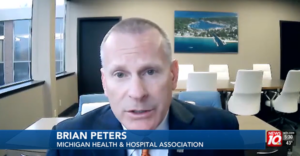
The MHA received media coverage over the holidays during the weeks of Dec. 18, Dec. 25 and Dec. 31. Topics covered include the healthcare workforce, the MHA Keystone Center, air ambulance services and a review of 2023.

Below is a collection of headlines from around the state, which include interviews with MHA CEO Brian Peters; Ruthanne Sudderth, senior vice president and chief strategy officer, MHA; and Sarah Scranton, vice president, safety & quality and executive director, MHA Keystone Center.
Monday, Jan. 1
- Michigan Business Network: Michigan Business Beat | Brian Peters Reviews 2023
Saturday, Dec. 30
- The Detroit News: Michigan not inspecting hospital helicopter landing sites often enough, audit says
Thursday, Dec. 21
- The Alpena News: New laws against workplace violence
Tuesday, Dec. 19
- Michigan Business Network: Michigan Business Beat | Sarah Scranton M.H.A. Keystone Center Overview On Quality And Safety
Monday, Dec. 18
- Crain’s Detroit Business: Rebuilding the health care talent pipeline using Registered Apprenticeship Programs
Members with any questions regarding media requests should contact John Karasinski at the MHA.





